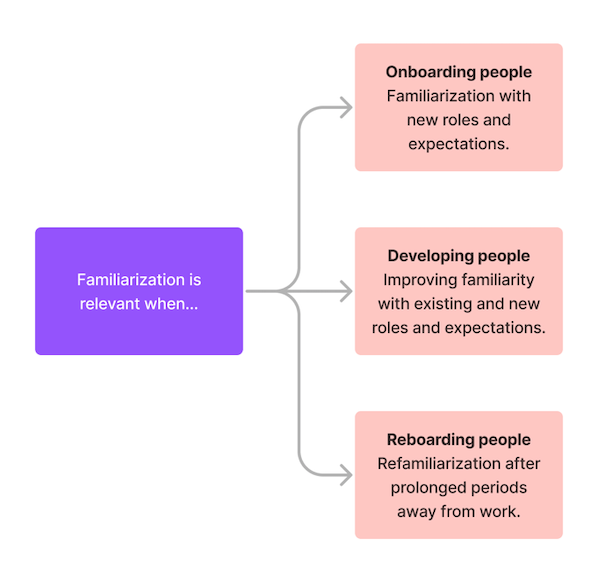Familiarity
How to excel in any role
Throughout life, we are constantly taking on new roles and expectations, both in our personal lives and at work. In this article, I discuss how you can train yourself and the people around you to enter into any new role with confidence and a growth mindset.
When I was a child, my father tried to teach me to sail. His father, siblings and himself were all capable sailors, and he was hoping to enable my brother and me to take part in an activity that his entire extended family felt greatly connected to.
I remember reading a book with schematics on how the wind hitting the sail from the right angle would push the boat forward, but I just couldn't wrap my head around how or why that would work.
In an attempt to help me, my father put me in a boat, pushed me from shore and tried to guide me from the shoreline, hoping that I'd develop an intuition for how things worked. But my fear of water and the unknown conquered my ability to think clearly. Sadly, I never became a sailor.
Growing familiar with role expectations
When we're looking to adopt a new role, be it a sailor or a role in an organization, it's crucial to identify and develop our familiarity with the expectations of that role.
Systematically improving our familiarity with role expectations is the most efficient way for us to reach a value-adding stage where we're able to practice the role comfortably, autonomously, effectively and fearlessly.
There are a lot of different types of expectations that can be associated with a role. In the context of a sailor, some examples might include:
- Responsibilities, like giving way to other boats
- Skills, like knowing the different terms used on a boat, like port and starboard
- Processes, like turning the bow of the boat through the wind so that the wind changes from one side of the boat to the other side
- Checklists, like how to prepare the boat for a trip
- Risks, like capsizing and ending up in the water
- etc...
Being new to a role is not the only situation in which developing familiarity is relevant, though. In a team or an organization, there are three primary contexts where familiarization is key:

Levels of familiarity
To help improve our familiarity with expectations, it is extremely useful to have a shared vocabulary enabling us both to better understand our own level of familiarity, and more effectively communicate it to others.
I have found that familiarity can be broken down into one of four levels, each building on top of the previous one:
Using these four levels, we can reflect on what's keeping us from reaching the next level of any particular expectation, by asking ourselves or each other questions like "What do I not understand about this expectation?" or "Why am I not comfortable with this expectation?".
Familiarity as a combatant of frustration
It is very common to grow frustrated with people not meeting expectations, whether it be in a personal setting with family members or an organizational setting with an employee or a manager.
Instead of assigning blame or venting frustrations in other ways, try considering which level of familiarity that person has with the particular expectation. Are they actually aware of it? Do they properly understand and are comfortable adhering to the expectation? Have they automated it yet?
Instead of guessing, you're probably better off asking the person in question. A lot of the time, you'll get answers you did not consider and a much better understanding of what you can realistically expect at the present moment.
Familiarity in the context of expectation systems
Most organizations have one or more systems in which they maintain role expectations to ensure that expectations are crystal clear and absorbed by the relevant role holders.
Wherever you have a system containing some sort of role expectation, look for ways to collect and communicate around each individual's familiarity with the individual expectations.
This not only ensures that people are aware of those expectations, but also helps you more easily understand what's holding them back, and how you can more effectively help them reach the next level of familiarity.
Some of the systems where collecting familiarity data is useful, includes:
- Training and onboarding systems
- Career development systems
- Knowledge management systems
- Quality management systems
- Goal tracking systems
- Risk management systems
- Market insight systems
If you find it difficult to find systems with support for familiarity built-in and would rather not manage it yourself, you might want to check out the Wecomplish platform.
Conclusion
The concept of familiarity is a great tool and mental model for aligning people around expectations and helping people excel in their roles by improving their familiarity over time.